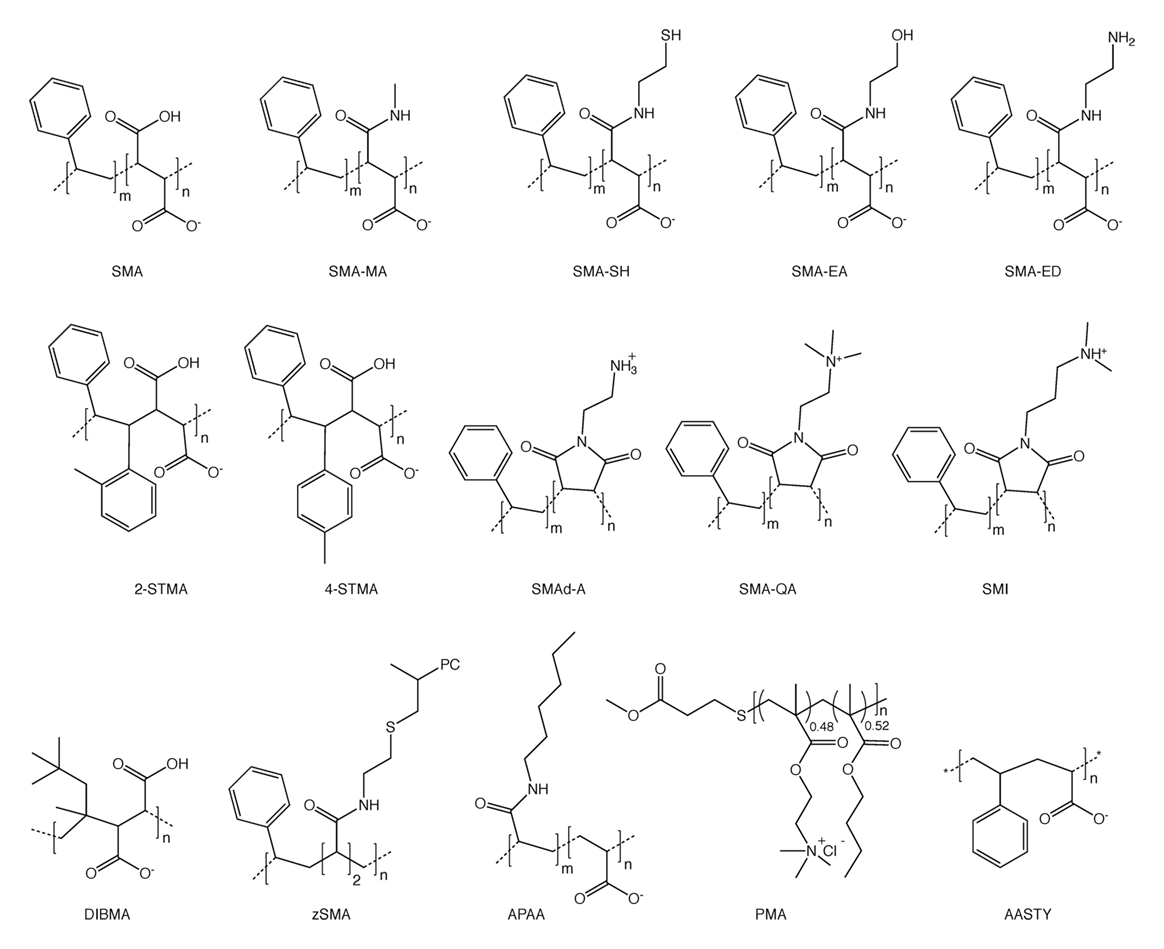Commercial SMA Polymers
The discovery that copolymers composed of styrene and maleic acid groups can solubilize native lipid:protein complexes direct from cells or raw membrane has stimulated a flurry of new research.
Cube Biotech offers a range of SMALP products that have been widely used and are recommended to test and optimize purification of membrane proteins along with bound lipids and partner proteins.
| Product | S:MA Ratio† | Mw† (g/mole) | Source |
| SMALP 140 | 1.4:1 | 5 kDa | Aurorium and Cube Biotech |
| SMALP 140-I | 1.4:1 | 5 kDa | Aurorium and Cube Biotech |
| SMALP 200 | 2:1 | 6.5 kDa | Aurorium and Cube Biotech |
| SMALP 300 | 3:1 | 10 kDa | Aurorium and Cube Biotech |
| SMALP BZ25 | 25% | 5.5 kDa | Cube Biotech |
| SMALP BZ30 | 30% | 5.5 kDa | Cube Biotech |
| SMALP BZ35 | 35% | 5.5 kDa | Cube Biotech |
| SMALP BZ40 | 40% | 5.5 kDa | Cube Biotech |
| SMA-EA | 1.1:1 | 7.8 kDa | Anatrace and Molecular Dimensions |
| SMA-ED | 1.1:1 | 7.8 kDa | |
| SMA-QA | 1.1:1 | 9.0 kDa | Anatrace and Molecular Dimensions |
| SMAd-A | 1.1:1 | 7.8 kDa | Anatrace and Molecular Dimensions |
| zSMA-116 | 1:1 | 20-27 kDa | Anatrace |
Contact Cube Biotech for ordering SMALP reagents as well as the TM Screening Kit, which includes 30 copolymers derived from 5 backbones to screen for the optimal copolymer for your membrane protein target.
† The SMA copolymers are defined by the average ratio of styrene to maleic acid repeat units (S:MA). The lengths and blockiness of the polymers is different for each. The number average molecular weight (Mn) is total weight of the polymer molecules divided by the number of molecules. The weight average molecular weight (Mw) is more sensitive to the larger chains present. The polydispersity index (PDI) equals Mw/Mn and is a measure of distribution of the molecular weights.
Related polymers that form native nanodiscs
In addition to SMA polymers, related synthetic copolymers convert membranes into discs and are listed below.
Notes:
* CyclAPols C6-C2-50 and C8-C0-50 are referred to as Ultrasolute Amphipol 17 and Ultrasolute Amphipol 18, respectively, by Cube Biotech and were developed by Dr. Manuela Zoonens and colleagues at CNRS, France as published in Anal Chem (2022) and Biomacromolecules (2020).
SMALP 140, 200 and 300 reagents are produced by Aurorium and sold through Cube Biotech.
SMALP-BZ reagents were developed by Cube Biotech in collaboration with Prof. Bert Klumperman from Nanosene, a spinout company of Stellenbosch University in South Africa; they are synthesized via RAFT polymerization to generate a better defined polymer size and a low dispersity.
DIBMA is based upon the work of Sandro Keller. Anatrace and Cube Biotech are offering ready-to-use DIBMA products in two buffer systems as well as protocols and services. Sokalan CP9 is the tradename of an alternating copolymer of maleic acid and diisobutylene (2,4,4-trimethylpent-1-ene) (DIBMA).
PMA refers to polymethacrylate copolymer product "N−C4−52−6.9" from Avanti. This belongs to the family of polymers in Prof. A Ramamoorthy's JACS paper in 2017.
Figure: Polymers developed by the research community for native nanodisc production.

We welcome you to discuss your thoughts on SMA and related polymers below or by contacting us.

